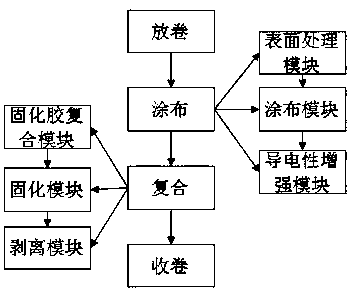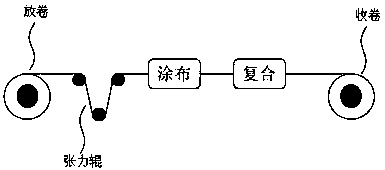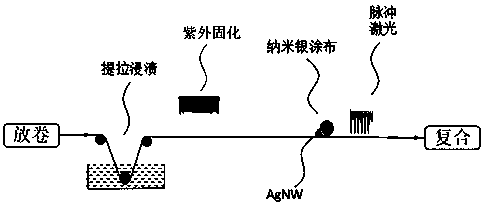A roll-to-roll process method for preparing high-performance nano-silver wire transparent conductive film
A transparent conductive film and nano-silver wire technology, which is applied in the manufacturing of circuits, electrical components, cables/conductors, etc., can solve the problems of being in the primary stage, high cost, and incompatible with the roll-to-roll process, etc., and achieve enhanced stability and electrical conductivity. The effect of sex, simple means and low cost
- Summary
- Abstract
- Description
- Claims
- Application Information
AI Technical Summary
Problems solved by technology
Method used
Image
Examples
Embodiment 1
[0041] Embodiment 1: Nano-silver wire coating module (such as image 3 )
[0042]The nano-silver wire solution is prepared. The average diameter of the nano-silver wires used is 34 nm and the length is 18 um. The nano-silver wires are dispersed in the ethanol solution with a concentration of 10 mg / ml. The nano-silver wire dispersion was mixed with anhydrous isopropanol at a mass ratio of 1:4, and was shaken uniformly by ultrasonication for 10 minutes to disperse. The optically transparent film used is polyethylene terephthalate (PET), which is transferred to the coating module through the unwinding roller and the tension roller; The toluene solution of APTES (5wt%, ultrasonic treatment for 10min) passed the PET film through the impregnation module at an unwinding speed of 1 m / min and a tension of 50N, and the pure water contact angle of the obtained PET film changed from 70° to 40°; After the baking treatment at 100 degrees Celsius (about 15 minutes), UVO treatment for about...
Embodiment 21
[0043] Example 2.1: Composite modules (eg Figure 4 )
[0044] The composite module includes a surface treatment module, a doctor blade coating module and a curing module; a 3 wt% aminomethyltrimethylsilane solution is configured in a petri dish and placed in a closed chemical reaction furnace with the temperature set at 70°C; The film obtained after coating nano-silver wires is subjected to a chemical reaction furnace to complete the surface treatment process, and a hydrophobic layer is deposited on the surface of the film to enhance the hydrophobicity of the substrate; the treated film is sent to the doctor blade coating module. The curing glue is epoxy resin. By controlling the distance between the scraper and the substrate, the thickness of the coated epoxy resin is about 500 um; the epoxy resin is fully cured by heating, the curing time is 20 s, and the curing temperature is 80°C; The epoxy resin-silver nanowire-PET composite film structure embedded with silver nanowires...
Embodiment 22
[0045] Embodiment 2.2: Composite module and composite film performance test (such as Figure 5 )
[0046] Configure a cyclohexane solution of 2wt% octadecyltrichlorosilane, shake it up to make the solution uniformly dispersed and add it to the dipping tank; the PET-nano silver wire film obtained in Example 1 is passed through the dipping module to make the PET A hydrophobic layer is deposited on the surface, and the hydrophobicity is enhanced. Apply NOA UV-curable adhesive on the target substrate PET by doctor blade coating, and the film thickness is controlled at about 500um. The surface-treated PET-nanometer silver wire film and PET-NOA were pressed together by a pressure roller and then cured by ultraviolet light. The curing wavelength was set to 365 nm, the curing optical power density was 15 mW / min, and the curing time was 5 min. After curing, a composite film structure of PET-NOA-nanowire-PET is formed (such as Figure 8 shown); after stripping and winding, the multip...
PUM
| Property | Measurement | Unit |
|---|---|---|
| diameter | aaaaa | aaaaa |
| concentration | aaaaa | aaaaa |
| contact angle | aaaaa | aaaaa |
Abstract
Description
Claims
Application Information
 Login to View More
Login to View More - R&D
- Intellectual Property
- Life Sciences
- Materials
- Tech Scout
- Unparalleled Data Quality
- Higher Quality Content
- 60% Fewer Hallucinations
Browse by: Latest US Patents, China's latest patents, Technical Efficacy Thesaurus, Application Domain, Technology Topic, Popular Technical Reports.
© 2025 PatSnap. All rights reserved.Legal|Privacy policy|Modern Slavery Act Transparency Statement|Sitemap|About US| Contact US: help@patsnap.com



